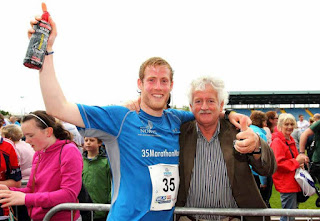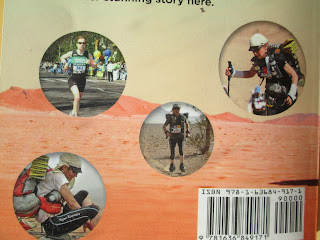Confronting
the health vulnerabilities of our parents is one of the great challenges of
life.
When Alan Corcoran’s father suffered a stroke at age 60, he was desperate for answers, but the future was uncertain. To make matters worse, he was not physically close to his dad when the stroke happened, which made him feel guilty. Even though he had awakened to the fragile nature of life before through the unexpected loss of young friends, he had never thought about the possibility of losing his parents.
Amid the turmoil, Alan opened a door of hope: he decided to revive the dream he had harbored in his mind for years; he would
run the lap of Ireland, circumnavigating the whole country on foot in 35 days,
and he would use this endeavor to fundraise for the Irish Heart Foundation and
the National Rehabilitation Hospital (NRH), to support their stroke and brain
injury unit. Furthermore, he would contribute ten percent of his fundraising to
a peacebuilding charity that his dad, Milo Corcoran, had established: The Football Village of Hope, an organization that brought Israeli and Palestinian children
together through the game.
Alan Corcoran had pushed aside his athletic aspirations years before this incident because of an unexpected stress fracture.
His
lack of training and experience with marathons did not scare him. His resolute
attitude drove him toward his dream. He was steadfast in his plan. The
preparation to be ready for this special marathon is one of the relevant
aspects of the story. It happened in 2012, when Alan was busy completing his
last year of college, writing his dissertation and working part-time as a hotel
dish-scrubber.
Athletic training is multidimensional, involving
physical skills as well as mental and emotional resilience. Yet in this
specific case it also pertained to the activity of raising funds, the logistics
of which was not a minor aspect of the whole process.
While his dad would be busy working hard on
his rehabilitation, Alan would be training to accomplish a goal that would make
his father proud, promote health and support their community.
Alan
Corcoran’s vibrant personality shines through every page of the story combining
humor, wisdom and patience. I appreciated the brief descriptions of the
landscapes of Ireland, where he enjoyed the freedom of running in nature.
Alan
Corcoran’s book, “Marathon Man” recounts how he accomplished his feat,
propelling us to pursue our own dreams, reminding us that no matter what we do,
there will always be hurdles and challenges. It is imperative to accept those
obstacles, and to be prepared to cope with them.
You don’t need to be an athlete to benefit
from reading this book, but those who are interested in running a marathon will
learn a lot from his advice and experience.
Getting
close to the end of this marathon, I could see how Alan learned to embrace the
difficulties and to use them to build up resilience and determination in the
face of adversity:
“More seasoned now, I’d accepted there’d be
punches and life was easier if I just rolled with them. There’d be wrong turns,
injuries, malfunctioning watches, missed feeds but I had to get on with things
the best I could and keep the positive vibes flowing.”
This inspiring read is also a celebration of
family bonds, friendship and the power of community. His words on running
epitomize his gratitude for life and for the joy and gift of aligning his
talent with the wellbeing of others:
“Whenever
the haze of energy-zapping suffering lifted, mental space became available to
appreciate my surroundings and my fortunate circumstances. I was outside,
roaming Ireland’s landscapes, grateful for the lull in pain. I felt more than
just gratitude in scenery like this. I was euphoric, deeply inhaling the
countryside. I was engaged in a passion project for a meaningful cause, with my
friends and family supporting me, travelling on foot through a postcard
landscape. I went through an overwhelming pendulum of emotions, from cursing my
Achilles and the barrage of hills to feeling like I wouldn’t want to be
anywhere else in the world.”
To learn
more about Alan Corcoran, you can visit his websites.
https://linktr.ee/MarathonMan1
If you enjoyed this post, feel free to check my writing on "Running for Good":
https://juliahoneswritinglife.blogspot.com/2021/12/running-for-good-fiona-oakes-story.html









